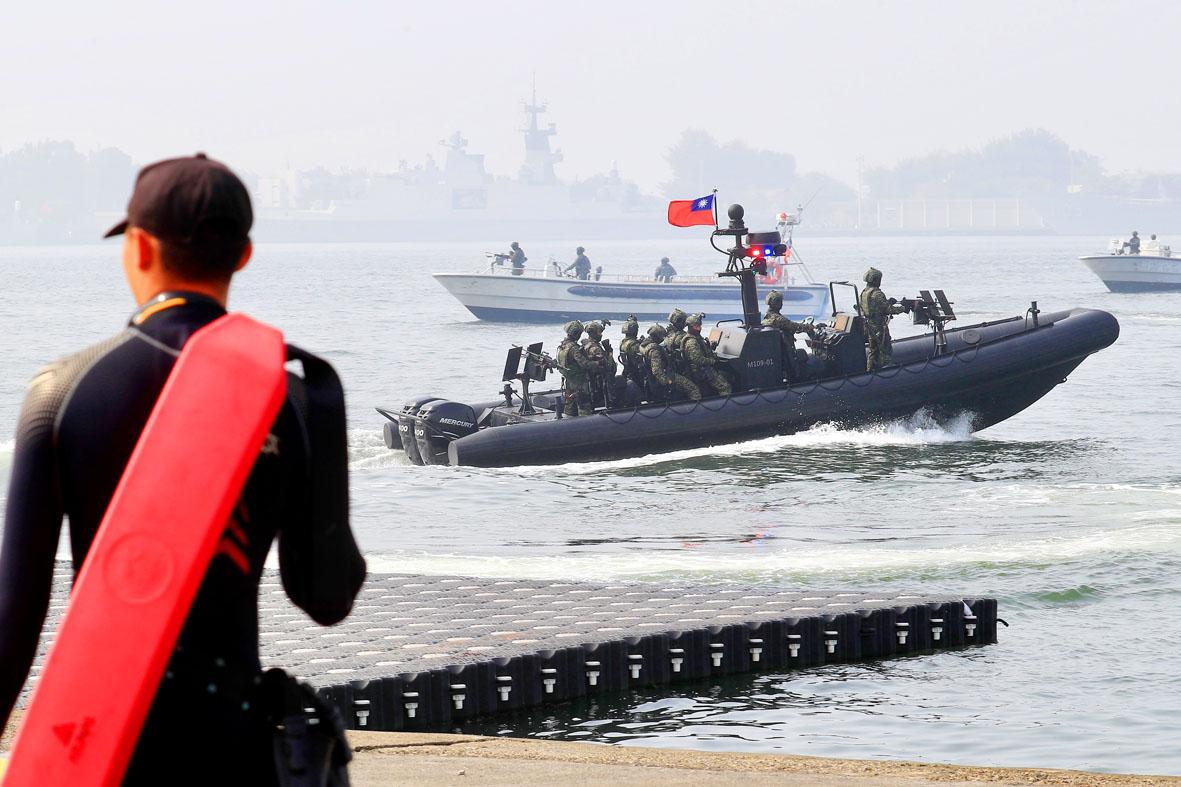Military experts yesterday urged the Ministry of National Defense to increase defense spending to at least NT$400 billion (US$14.15 billion).
The academics made the suggestions after China on Friday unveiled its national defense budget of 1.35 trillion yuan (US$208 billion), which is 16 times larger than Taiwan’s defense budget of NT$361.7 billion.
Su Tzu-yun (蘇紫雲), director of the Institute of National Defense and Strategic Research’s division of defense strategy and resources, said the year-on-year increase of Chinese defense spending was political and defense-related.

Photo: EPA-EFE
The year 2027 would mark the centennial of the founding of the Chinese People’s Liberation Army (PLA), which it plans to celebrate by launching its third carrier, and continuing production of Type 075 amphibious assault ships, Type 096 ballistic missile submarines and H-20 stealth bombers, Su said.
The new units would allow China to stabilize its influence within the first island chain and further project its power into the second island chain, satisfying Beijing’s military and political goals, he said.
The increased production of military hardware would also be in line with Chinese President Xi Jinping’s (習近平) promotion of a “dual circulation” strategy, as it would stimulate the economy, bolster the military and achieve political stability, Su said.
Su also said the ministry should scale its defense spending to at least NT$400 billion to balance the military’s upkeep costs and investment in precision munition and platforms.
National Taiwan University associate professor of political science Chen Shih-min (陳世民) said that the disparity in defense spending across the Taiwan Strait has been extant for many years, adding that the Chinese military’s near-daily incursions into Taiwan’s air defense identification zone over the past half year is clearly hostile and threatening.
Despite this, Taiwan’s national defense has failed to comprise 3 percent of its GDP, while Israel, which faces military threats that are no less severe than Taiwan’s, has maintained defense spending equal to 5 percent of its GDP, he said.
Chen said that he was not arguing for a military arms race with China, but current defense spending would be hard-pressed to keep up with the cost of arms sales packages announced under former US president Donald Trump and President Tsai Ing-wen’s (蔡英文) adoption of an indigenous arms manufacturing program.
Sheu Jyh-shyang (許智翔), a postdoctoral fellow at the Institute for National Defense and Security Research, said that the disparate funding available to Taiwan and Chinese militaries lends more credence to support asymmetric warfare.
Sheu cited the use of large quantities of precision munitions to target platforms developed by China, as an example of goals for Taiwan to focus on.

The US government has signed defense cooperation agreements with Japan and the Philippines to boost the deterrence capabilities of countries in the first island chain, a report by the National Security Bureau (NSB) showed. The main countries on the first island chain include the two nations and Taiwan. The bureau is to present the report at a meeting of the legislature’s Foreign Affairs and National Defense Committee tomorrow. The US military has deployed Typhon missile systems to Japan’s Yamaguchi Prefecture and Zambales province in the Philippines during their joint military exercises. It has also installed NMESIS anti-ship systems in Japan’s Okinawa

‘WIN-WIN’: The Philippines, and central and eastern European countries are important potential drone cooperation partners, Minister of Foreign Affairs Lin Chia-lung said Minister of Foreign Affairs Lin Chia-lung (林佳龍) in an interview published yesterday confirmed that there are joint ventures between Taiwan and Poland in the drone industry. Lin made the remark in an exclusive interview with the Chinese-language Liberty Times (the Taipei Times’ sister paper). The government-backed Taiwan Excellence Drone International Business Opportunities Alliance and the Polish Chamber of Unmanned Systems on Wednesday last week signed a memorandum of understanding in Poland to develop a “non-China” supply chain for drones and work together on key technologies. Asked if Taiwan prioritized Poland among central and eastern European countries in drone collaboration, Lin

NO CONFIDENCE MOTION? The premier said that being toppled by the legislature for defending the Constitution would be a democratic badge of honor for him Premier Cho Jung-tai (卓榮泰) yesterday announced that the Cabinet would not countersign the amendments to the local revenue-sharing law passed by the Legislative Yuan last month. Cho said the decision not to countersign the amendments to the Act Governing the Allocation of Government Revenues and Expenditures (財政收支劃分法) was made in accordance with the Constitution. “The decision aims to safeguard our Constitution,” he said. The Constitution stipulates the president shall, in accordance with law, promulgate laws and issue mandates with the countersignature of the head of the Executive Yuan, or with the countersignatures of both the head of the Executive Yuan and ministers or

BACK TO WORK? Prosecutors said they are considering filing an appeal, while the Hsinchu City Government said it has applied for Ann Kao’s reinstatement as mayor The High Court yesterday found suspended Hsinchu mayor Ann Kao (高虹安) not guilty of embezzling assistant fees, reducing her sentence to six months in prison commutable to a fine from seven years and four months. The verdict acquitted Kao of the corruption charge, but found her guilty of causing a public official to commit document forgery. The High Prosecutors’ Office said it is reviewing the ruling and considering whether to file an appeal. The Taipei District Court in July last year sentenced Kao to seven years and four months in prison, along with a four-year deprivation of civil rights, for contravening the Anti-Corruption